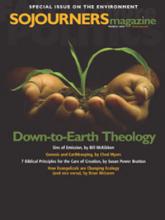A commercial fisher winches up his net. A new crew member sees him tossing large and very edible fish overboard. "Why throw those nice salmon back when they're already dead?" the novice asks. "The regulations only let me keep the rockfish I'm officially going for, and stray sea bass." replies the fisher. "If I land the salmon, I'll lose my license and get fined."
"But aren't they wasted? Couldn't you at least give them away?"
"The fisheries agencies think if they let me keep the salmon at all, I'll start targeting them." The fisher grunts. "I don't like it—I shouldn't waste anything someone could eat. I'd be glad to freeze the discards and give them to the food bank. My dad was a good Christian—he'd always give some of his catch to folks in need."
AMONG RESOURCE-BASED businesses, ocean fisheries have one of the gravest problems with waste. Crews toss overboard fish that are too small, the wrong gender, the wrong species, or out of season. Captains who are over their quotas dump millions of tons of excess fish at sea.
All forms of natural resource harvesting and food gathering by people kill some non-targeted species or disturb key ecosystem processes. Industrialized harvest methods—particularly those using heavy equipment—cause extensive collateral damage to natural habitats. Many modern methods of natural resource collection also cause degradation or abandonment of useable materials or foodstuffs. Harvest of quality hardwoods from tropical rainforest, for example, results in high grading of the most desirable species, often injuring the less valuable trees left behind. Hydroelectric projects can drown thousands of acres of productive farmland.
Read the Full Article

